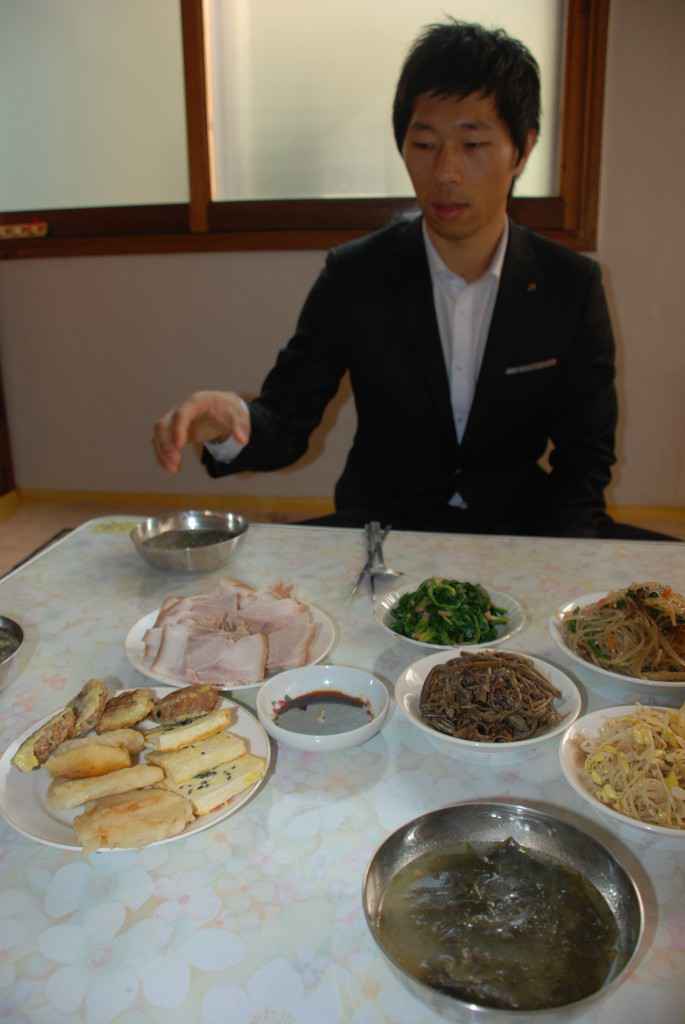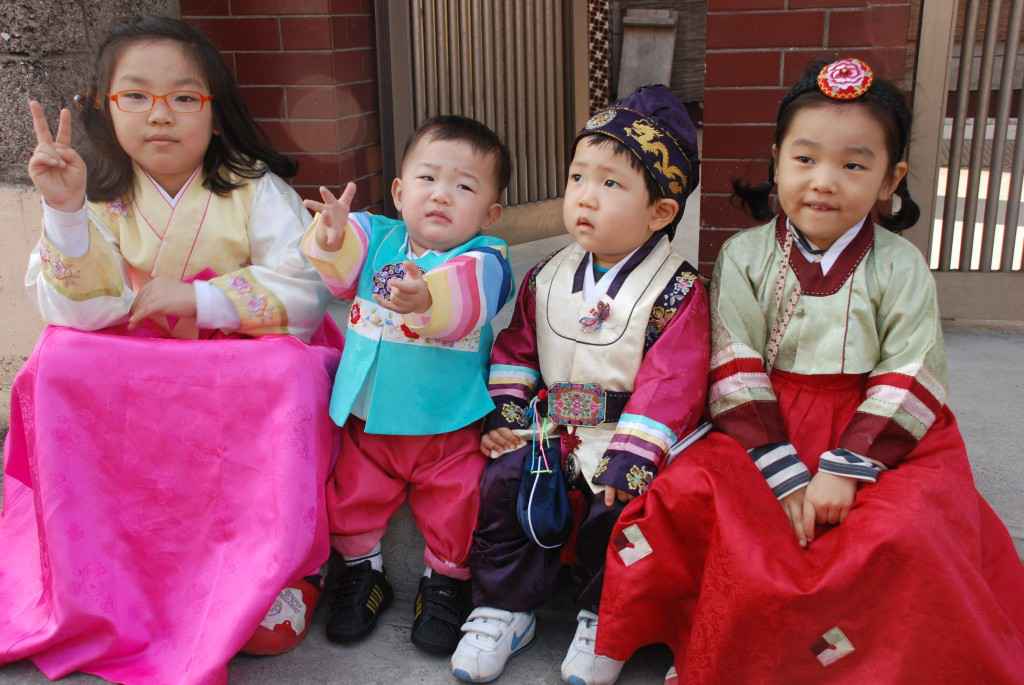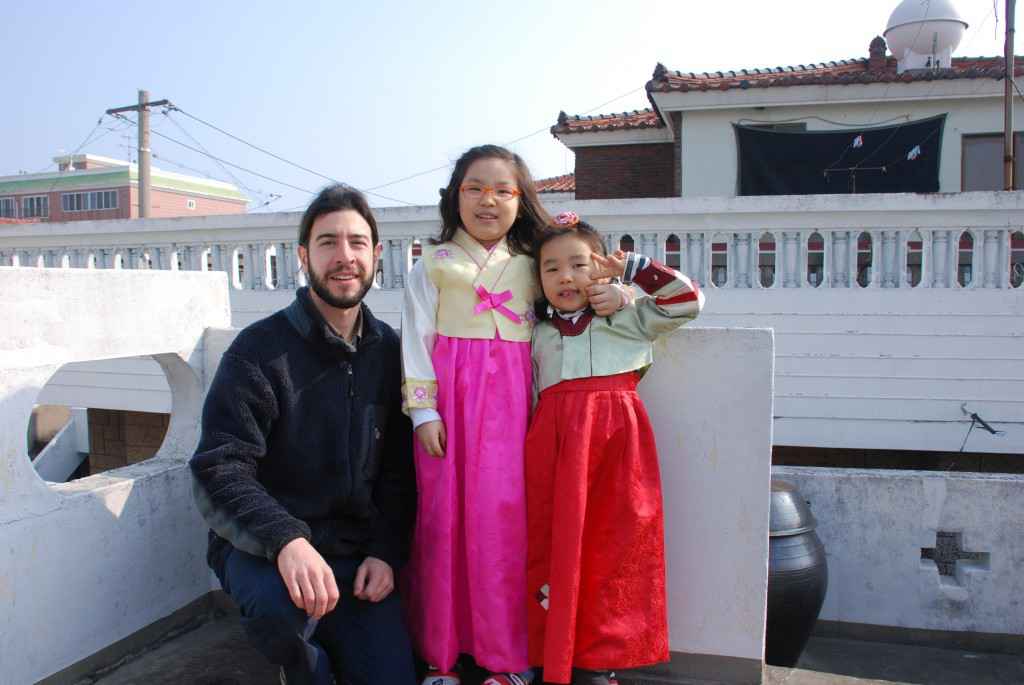By Stephen Bugno
On the morning of the Korean Lunar New Year, Eun Taek picks me up in his white Hyundai SUV. His parents are sitting in the back seat and we are on the way to his uncle’s house. Besides his cousin and two nieces, we are the first to arrive.
In the smallest room of the house is a makeshift shrine to their deceased ancestors. There are two tall white candles burning, neat stacks of oranges, bananas and a few bottles of alcohol. There is also a crucifix which looks slightly out of place. “We are Catholic.” Eun Taek would later tell me.

A beautiful folding wall of painted Chinese calligraphy is the backdrop. It is here that Eun Taek and his parents bow to honor their departed relatives. The bow, or sebae, is a full one—first dropping to the knees, then hands, followed by the forehead to the floor.
“Have you eaten breakfast?” Eun Taek asks. I have not. I have prepared myself for a long day of eating, drinking, and visiting. We sit down at the table.

Out comes seaweed soup, a bowl of rice and several side dishes. Included are some specialties that only come out for New Year—dok, jon, and japchae. We finished with a cup of coffee and fruit selection—pears, apples, and persimmon peeled and sliced.
Soon the other uncle and several other cousins and nieces and nephews show up. Another table will soon be set up to accommodate the new guests and more food will come out. But first we will bow to the elders, like we have already done to the deceased. In exchange, the elders will give advice to the younger generations.

One of the cousins has been married a year and a half. She is told that it is time to have a baby already. Eun Taek is now 27. He should get married and get a job. He does have a job already, he tells me. He’s extending his work for another year in Kenya with a Korean NGO; he just hasn’t informed his family yet. Then we fill up the living room, kneeling on the floor to say some prayers reading out of a Catholic prayer book.
For the next few hours I talk to the few people that can speak English and play with the kids, who are dressed in their colorful hanbok, the traditional New Year outfit.
By mid-afternoon it’s time to move on and we pile back into the car and drive out to the countryside near Hallim where Eun Taek’s house is located. His parents are pig farmers as my nose reaffirms the fact when I step out of the car. We spray our shoes because of the foot and mouth disease that afflicts mainland Korea. It hasn’t reached Jeju yet, so local pork is fetching a higher price right now.

Before going to his grandmother’s home, we stop by another uncle’s house to pick up a couple crates of tangerines and some grilled seafood—skewers of fish and octopus. At her house, his grandmother lets us try one of her homemade brews—it is dark in color, has slight alcohol content and tastes very herbal and medicinal. It would take a google search later to find out what we were drinking.
Eun Taek called it ogapi and it must be related to Ogalpigi which is a medicinal wine made from the bark of Eleutherococcus sessiliflorus blended with soju and sugar. Except I don’t think Grandma blended hers with soju and sugar. The bark has similar qualities to those found in ginseng.

Earlier in the day, Eun Taek had told me the background to a tradition that we are about embark on as soon as we leave grandmother’s. But we’re a little late in joining the group. He and thirteen of his former classmates (there were only 20 in his class) drive around to each of their family’s houses together and pay their respects to both the ancestors and the elder of the household.
By this point I was participating in the bowing with the 13 others like normal. One of his friend’s father had died within the last year, so we did 2 ½ bows that time. Many of his friend’s families are pig farmers too (or other farmers) so several times we drove through the mandatory car spray set up along the road for the extra protection against foot and mouth spreading.
The last of the thirteen houses was Eun Taek’s. We did the same bowing rituals but afterwards everyone lingered for some light food, fruit, and rice wine. As if we didn’t have enough to eat already, the family and I had supper after all the guests left. By 8:30 the little ones were exhausted and so were the adults and that’s when our long day ended.
Seems like you had a nice holiday! 🙂 He’s family is Christian I assume. Hanbok is beautiful, isn’t it? All the colors. Glad you had our nice tradition! 🙂
@Juno, It was a really nice holiday. Really interesting to experience all the traditions and food.
Those kids look adorable in their little new years garb.